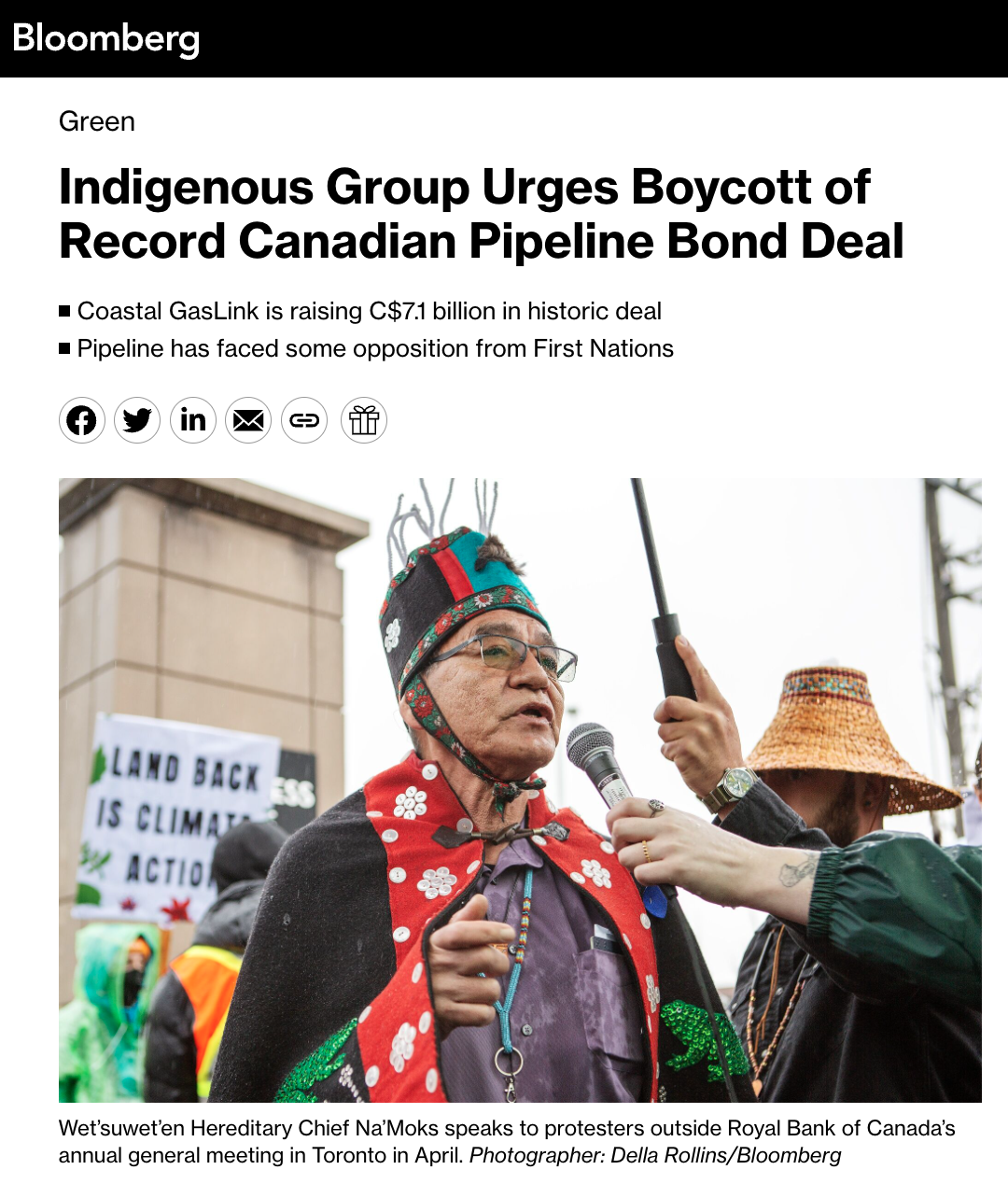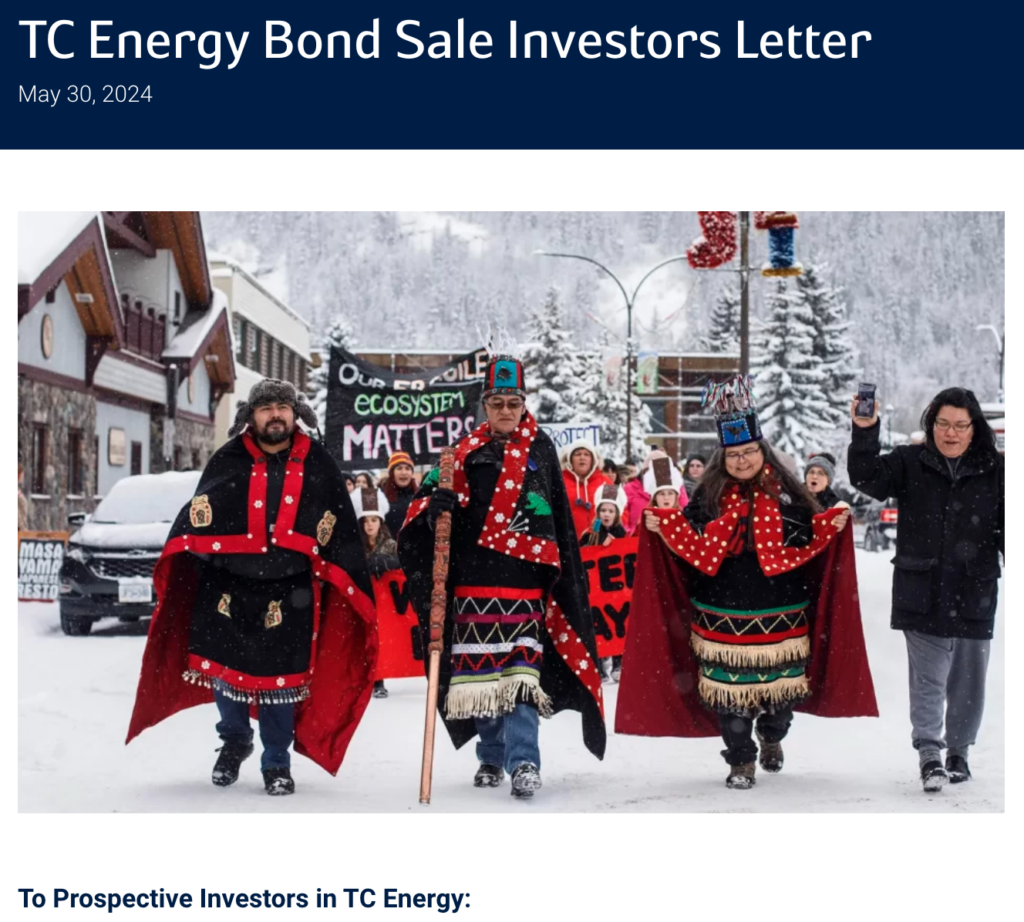The largest Canadian dollar corporate bond in history, record $7.1 billion Canadian dollars, will be issued this month to fund Coastal GasLink (CGL). This bond will finance the massive debt incurred by the 670 km gas pipeline, owned by KKR, Alberta Investment Management and TC Energy.
In response, the Hereditary Chiefs of the Wet’suwet’en have sent a letter to investors asking them to publicly announce a commitment to deny new debt ahead of TC Energy’s bond issuance this June, and fully divest from CGL.
The banks underwriting the deal include Royal Bank of Canada, Bank of America, Canadian Imperial Bank of Commerce and Bank of Montreal.
Coastal GasLink has been built without the consent of hereditary leaders in many of the territories it crosses. It is only through heavy militarized and often violent support from the federal Canadian police that this pipeline has been built. It has been subject to several reports by the UN Special Rapporteur on the Rights of Indigenous Peoples, José Francisco Calí Tzay. The pipeline has suffered numerous regulatory infractions, and faced significant cost overruns and delays.
Investors have the responsibility to ensure returns are not generated through violating human rights, polluting the air and water of communities, or contributing to increasing climate-heating emissions. In addition to the obvious reputational and climate risks of continuing to fund expansion of this controversial project, they should consider the financial risk of investing in a project with a history of delays, ballooning budgets, operating without consent and and likely facing a future stranded asset risk.
This call is supported by over 65 organisations, including the Toxic Bonds Network, stand.earth, Indigenous Environmental Network, Banktrack and Greenpeace Canada.
Coastal GasLink Phase Two: no permits
CGL is pursuing Phase 2 of the pipeline project alongside LNG Canada, with plans to build additional compressor stations to increase capacity of the pipeline.
This includes the Titanium Peak Compressor Station in the Regional District of Bulkley-Nechako, one of two stations in unceded Wet’suwet’en territory, approximately 85 km southwest of Houston, BC. This station would be near the Unist’ot’en healing centre bordering Gidimt’en territory and on Liksamysu territory. Wet’suwet’en members are deeply concerned about the proximity to important cultural sites and the prospect of noise pollution and chemical pollution that risk disrupting these important spaces. The proposed footprint of one compressor station is approximately 20 hectares of crown land, which is equivalent to 17 soccer fields. The Wet’suwet’en are also concerned about the additional years of construction traffic, and risks to vulnerable Indigenous women and children living near the proposed sites.
CGL does not have the permits for these compressor stations. Wet’suwet’en Hereditary Chiefs oppose these compressor stations and will pursue avenues to challenge these permits and construction.
Hereditary leaders do not consent
CGL pipeline cuts through Wet’suwet’en territory, which is divided into 5 clans and 13 house groups, and stretches over 22,000 square kilometres, wherein each clan has full jurisdiction to control access to its territory. They maintain their land use, occupancy, hereditary governance system, and are the title holders with the authority and jurisdiction to make decisions about unceded lands.
With respect to the law, they continue to assert their right to jurisdiction over their lands, to determine access and prevent trespass under ‘Anic ‘niwh’it’én (Wet’suwet’en law), and to Free Prior Informed Consent (FPIC) as enshrined in the United Nations Declaration on the Rights of Indigenous People (UNDRIP). The Coastal GasLink project is in violation of UNDRIP, which is recognised at both the provincial and federal levels in Canada.
The rights and struggle of Wet’suwet’en land defenders against this project have been recognized worldwide, including by the UN Human Rights Office of the High Commission. They were recently affirmed in a report by Amnesty International that outlined a years-long campaign of violence, harassment, discrimination, and dispossession against Indigenous Wet’suwet’en land defenders. The report examines the human rights violations inflicted upon members of the Wet’suwet’en Nation and their supporters by the authorities of Canada and British Columbia; CGL Pipeline Ltd. and TC Energy, the corporations building the pipeline; and Forsythe Security, a private security firm contracted by CGL Pipeline Ltd. CGL and Forsythe, along with the RCMP, are being sued for conspiracy, intimidation, private and public nuisance, intentional infliction of mental distress, and invasion of privacy in the BC Supreme Court.
Investing in CGL makes bondholders complicit in these violations, risking further reputational harm.
Economic risks: Coastal GasLink ballooning costs
There are considerable economic risks associated with CGL. Originally estimated at $6.6 billion, the pipeline’s construction expenses have spiralled to a staggering $14.5 billion. At a time where renewable energy is becoming more competitive and cost effective than fossil fuels, financial institutions should exercise caution and avoid investing in a project with such a precarious financial outlook. The dramatic cost escalation of CGL also exposes severe financial uncertainties, and is exacerbated by the ongoing environmental penalties and disputes that the CGL has been involved in.
COP28 signalled unambiguously that the era of fossil fuels must end. With increased climate action and increasing viability of renewable energy, there is an immediate risk that the CGL pipeline and LNG Canada, the export project which Phase two is supplying, will become stranded assets. With mounting debt, and an uncertain future, investors might find themselves out of pocket if the company is unable to pay its obligations to its investors.
As major economies commit to their carbon emissions targets and green energy goals ahead of 2050, many are seeing LNG as unviable. For example, the European Investment Bank and the Swedish Pensions Agency have deemed LNG investments as high-risk and economically unsound due to climate change concerns and potential for stranded assets.

